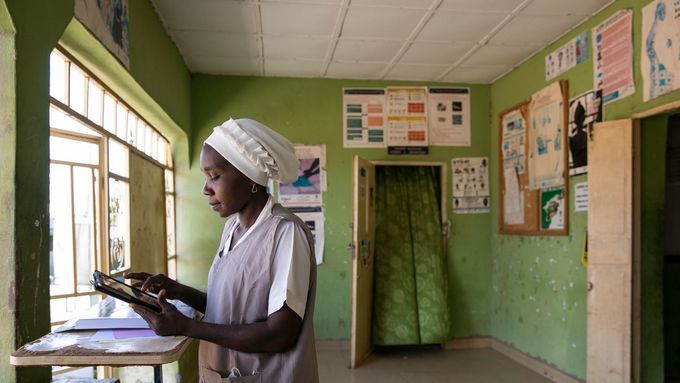Digital tools are critical to improve the care for sick children, particularly in resource-constrained settings. In a new study, Swiss TPH and partners were able to show the positive impact of a digital clinical decision support system on improving the management of childhood illness in primary care in Nigeria. The findings, published in BMJ Open, support the use of digital tools for health systems strengthening on a broader scale.

Photo credit: ICRC
Nigeria has one of the highest under-5 mortality rates in the world, attributed mostly to poor access and quality of care. To combat this, digital clinical decision support systems (CDSS) are critical to improve the management of childhood illness, particularly in remote regions and resource-constrained settings.
In a new study, researchers at Swiss TPH in partnership with the International Committee of the Red Cross (ICRC) and the Adamawa State Primary Health Care Development Agency evaluated the impact of one CDSS in particular called ALMANACH, short for ALgorithm for the MANAgement of CHildhood illness, in Nigeria. Findings showed that ALMANACH, when used in a real-world setting, had a very positive impact on the recovery of sick children, as well as the quality of care they received. The results were published in the peer-reviewed journal BMJ Open.
“These findings support the use of CDSS for overall health systems strengthening, especially when it comes to the management of childhood illness in geographic regions that have very limited access to healthcare,” said Torsten Schmitz, Senior Clinical Consultant at Swiss TPH. “Our findings demonstrate that digital health applications work; they improve the lives of children, and thus bring us one step closer to achieving universal health coverage.”
Large observational study
The study looked at a complete ALMANACH intervention package, which consisted of the digital tool coupled with training, mentorship and continuous feedback.
The study recruited over 1,000 children from 45 different primary healthcare facilities, and 900 children from 44 control facilities, all of whom presented with an acute illness. Children ranged from two months to five years old. This is the first study of its kind to evaluate the impact of a CDSS that focuses on an integrated management of childhood illness on health outcomes when implemented at scale in a resource-constrained setting.
“We were confident that ALMANACH would have a significant impact. However, when we saw the positive results we were overwhelmed to find such a large improvement in caregiver-reported recovery among children who visited facilities using ALMANACH,” said Schmitz. “We saw a more accurate use of diagnostics, lower oral antimicrobial prescription rate and better communication of diagnosis and follow-up advice. We attribute these effects mainly to healthcare providers improved adherence to evidence-based clinical guidelines when they were provided with a simple-to-use digital tool.”
About ALMANACH
ALMANACH is a user-friendly application that can be installed on Android tablets or smartphone and is used by doctors, nurses and community health extension workers to properly diagnose and treat common childhood diseases. It was developed by Swiss TPH and implemented in cooperation with the International Committee of the Red Cross (ICRC) and the Adamawa State Primary Health Care Development Agency in Nigeria. As of November 2021, ALMANACH is now fully operated by Nigerian health authorities to ensure a sustainable integration into the country after extensive capacity training on the usage of the tool.
Swiss TPH is currently developing tailored versions of ALMANACH in partnership with the ICRC and the local health authorities for Somalia and Libya.
